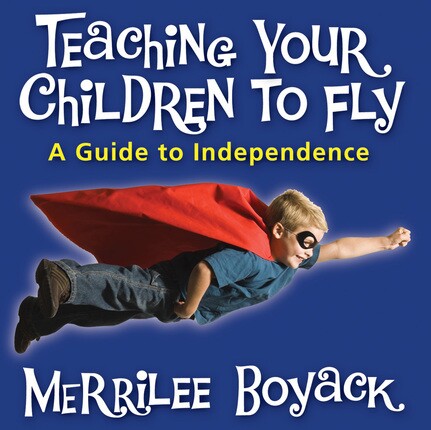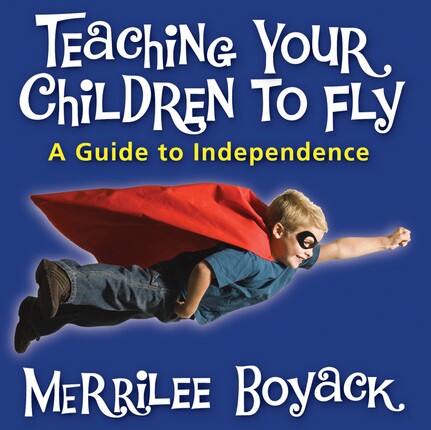All our lives we're taught to make plans and set goals and to write them down. We have a plan for our education, a plan for our career, a plan for our homes, and we have tons of plans for how to lose weight.
You wouldn't think of going on a family vacation without having at least some idea of where you were going and how long you were going to stay. And yet, most parents haven't even thought about having a parenting plan, much less writing one down. Being the rather obsessive-compulsive list maker that I am, I spent several months consulting with my husband on what we wanted to do with our children, and I actually wrote down The Plan.
Over the past 23 years we have, of course, modified and adjusted The Plan, and it has worked amazingly well. I call it "The Fabulously Brilliant, Flexible, and Comprehensive Plan for Raising Independent Children Who Will Be Able to Take Care of Themselves as Adults and Have a Family Plan of Their Own."
But how about if we just call it "The Plan" for short? To begin with The Plan, you need to start with the end in mind. Think back for a moment to when you first left home, perhaps for college or a mission or a job and apartment.When you moved out, what did you not know how to do? What came as a surpriseto you? I can remember several things: I had never had a checking account, never taken care of a car, never made my own doctor's appointments, and on and on. Spend a few minutes and come up with a list of things that you suddenly had to scramble to learn how to do.
Developing a Master Plan
Pull out a piece of paper and write, "How I Want My Children to Turn Out." You're probably going to want kids who can care for themselves, keep a job, have good professional and interpersonal skills, and so forth.
Now, we all want our children to be rocket scientists with huge back accounts and fabulous families, but let's be realistic. (I told my kids I needed one plastic surgeon, one mechanic, one dentist, and one travel industry professional to make my retirement perfect. None of them are cooperating.)
So, write five realistic main goals or results. This part of The Plan is absolutely crucial. You will be spending many hours of many days doing things that seem trivial or pointless, and you have to have that end goal firmly in mind to get yourself through them.
My husband and I made an incredibly long list of every task we could think of that our children needed to be able to do to get to the end goal of independence. You may start with ours, but don't assume it covers everything. We are constantly adding to our list and modifying it. I had to add all kinds of girls things like "hair management" that hadn't even occurred to me before.
Then we took each of these tasks and assigned it to an age at which we thought the child would be capable of learning it. Keep in mind that every child is different. Some learn things faster and are more motivated. So this needs to be a fairly flexible plan.
Let's start with 3 year olds. They should be able to begin learning to dress themselves, use the toilet by themselves, brush teeth, pick up toys, say prayers, and maybe clean glass tables. By 7, wash dishes, clean toilets, pull weeds, and have a savings account. At 14, be able to do some basic interior decorating, understand basics of food storage, and have social security card number memorized. You get the idea. In addition to the necessities, remember to customize the details of the list to your family's interests and needs. You may be big sports buffs or really into music, literary sponges, or the outdoorsy types. Make the list fit who your children are.
Training
Have a separate list for each child that you can all refer to. And always remember, this is a training program, not just chores. So unlike a checklist, this approach will take some different strategies.
Introduce the task far in advance.
For example, you can say, "Matthew, you get to learn how to make salads this year. Isn't that exciting! I think we'll work on that in about three months, so in June, we'll begin." This does a couple things. The first is that you can gauge the child's reaction, so you'll have a better idea how to go about the training. The second is that he'll have the chance for an observational training period, which sounds fancy but really just means he'll watch you make salads for the next three months and start helping a little.
Select the trainer.
In other words, it doesn't always have to be you. Dad, siblings, neighbors, grandparents, your friends, and their friends can all help. Don't forget to tap into all your sources: school, church, Scouts, and so on. And don't think you're imposing. How wonderful would you feel if someone came to you and said, "Merrilee, you have such a wonderful reputation as a bread maker. Could you teach my daughter how to do that?" I would first ask if they were taking hallucinogens, but then I would be so flattered!
And there's another advantage: There is no tool quite so wonderful for blasting through stereotypes as having a woman teach "guy" things and a man teach "chick" things. Who taught my boys how to make chocolate chip cookies? Their dad.
Hold several training sessions.
It takes an average child seven or eight presentations to learn something. You'll repeat a lot, but don't let that tempt you to be lazy about it. Be specific in each of the instructions every time. Then go through each step and after each one ask, "Do you have any questions on how to do this or what this means?" Remember these are training sessions; the kids aren't going for Olympic gold in bed making. Don't insist on perfection for a longtime. Just keep training. When they messup, you can reassure them, "We're just in thetraining period. You're supposed to mess up. That's called learning. Don't worry, you'll get the hang of it after you practice."
Follow up with practice sessions.
After many training sessions, allow the children to perform the task and then let you check it.
Incorporate the task into your lifestyle.
Eventually, the children will master the tasks, and when that happens, sit back and let them do it. The general rule: If they can do it, don't do it for them.You're probably wondering how far to take this. Remember to keep balance. My kids can wash their own clothes, and during the summer they do just that. During the school year, they bring their clothes down and I run them through, then they take them back up to their rooms and put them away.
They're hanging on to the skills, and we've adapted the requirements to fit their time constraints. One last note: Remember it's also important to keep doing a few things as part of your nurturing. Ann had taught all her children to cook. But every morning she made them breakfast as an expression of her love. Roger knew his kids were capable of doing the dishes, but he would always do them on Sunday after the big family dinner to show his love.
Learn more great parenting tips with Teaching Your Children to Fly.
Merrilee Browne Boyack is a popular speaker at BYU Education Week and Time Out for Women events. She is the author of Strangling Your Husband is NOT an Option and 52 Weeks of Fun Family Service, as well as talks on CD such as How Do I Change My Husband?and Teaching Your Children to Fly, from which this article is excerpted.






